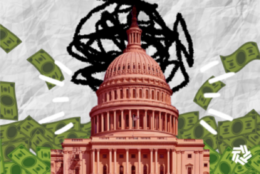Improper payments
-
Of the 24 CFO Act agencies — those required to have audited financial statements — about half failed to comply with the law on improper payments, according to a preliminary analysis of the IG reports by the accounting firm Grant Thornton. The low scorers include the agencies that misspent the most money: the departments of Health and Human Services, Treasury, Agriculture and the Social Security Administration.
June 08, 2015 -
The way to better, more trustworthy government is through fixing broken systems and processes, and funding them adequately, says Federal News Radio's Tom Temin in a new commentary.
March 31, 2015 -
Federal government agency improper payments are up almost $20 billion. The Government Accountability Office says its fiscal 2014 audit revealed agencies racked up a total of about $125 billion in improper payments. Beryl Davis, director of financial management and assurance issues at the GAO, tells In Depth with Francis Rose about the root causes of the spending errors.
March 23, 2015 -
Improper payments from the federal government reached an all-time high last year. They totaled more than $124 billion — a $19 billion increase from the previous high of $105 billion. That's according to a new report from the Government Accountability Office. White House officials are examining this trend and looking for ways to head improper payments down again. Danny Werfel, a former Controller in the Office of Management and Budget and now a Director with the Boston Consulting Group, joined Tom Temin on the Federal Drive with more on how they might to do that.
March 19, 2015 -
By STEPHEN OHLEMACHER Associated Press WASHINGTON (AP) — Federal agencies set a new record for improper payments last year, shelling out $125 billion in questionable benefits after years of declines. The payments included tax credits…
March 17, 2015 -
David Mader, OMB controller, said the administration will target specific agencies with new technology to access more data to combat this long-standing challenge. GAO reported Feb. 26 that the governmentwide improper payment rate was 4.02 percent, meaning agencies misspent almost $125 billion in 2014.
March 11, 2015 -
The IRS is in a bind to be both fast and accurate with this season's tax returns, and awards billions in fraudulent claims as a result. That's a problem that will only get worse unless Congress raises IRS' budget to allow for new hires, according to the National Treasury Employees Union.
February 24, 2015 -
The Office of Management and Budget is circulating a draft memo to CFOs to all-but-mandate the use of the Invoice Processing Platform (IPP) run by the Treasury Department. Sources say agencies would have to justify to OMB why they wouldn't use the IPP. It's part of the administration's effort to push agencies toward more financial management shared services.
February 18, 2015 -
The Social Security Administration used excess desktop computers and an open source platform to tackle its big data challenge. For its efforts, ACT-IAC named SSA's improper payments and data analytics program a finalist in the Igniting Innovation awards.
February 06, 2015 -
The inspector general of the Government Accountability Office says a former worker had been receiving improper payments from GAO for decades.
December 26, 2014 -
The Office of Management and Budget has given agencies new directions for tracking, reporting and overseeing improper payments. It comes in the form of an update of Appendix C to Circular A-123. Greg Wallig, managing director of Grant Thornton, joined Emily Kopp on the Federal Drive to explain the changes.
October 24, 2014 -
A new memo and guidance from OMB makes four significant changes to Appendix C of Circular A-123.
October 22, 2014 -
The office of compliance analytics at the IRS uses information, tools and analysis to help mission offices solve problems. Dean Silverman, a senior adviser to the IRS commissioner, said his office is trying to use these tools and approaches to improve the agency's outcomes and to create a data-driven decision-making culture.
September 17, 2014 -
The Office of Federal Financial Management is updating Circular A-123 to focus on risk management and data-driven decision-making. OFFM also plans on rescinding the financial systems requirements circular, A-127, in the coming weeks.
September 18, 2013 -
Senators on the Homeland Security and Governmental Affairs Committee have opened a new legislative salvo in the fight against improper payments: helping agencies stop payments to dead people. The new legislation, introduced by Sens. Tom Carper (D-Del.) and Tom Coburn (R-Okla.) the chairman and ranking member, respectively, of the committee would allow all federal agencies to access basic death data maintained by the Social Security Administration and require they use it to curb improper payments
August 30, 2013





